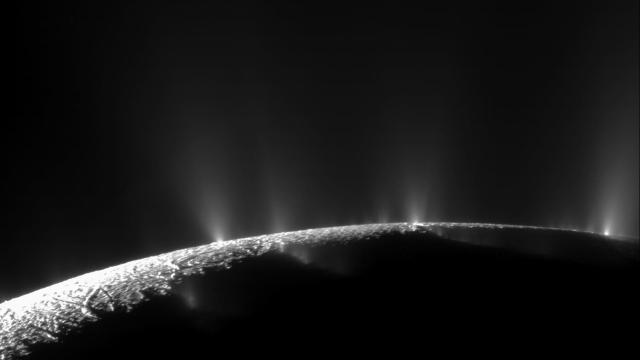Scientists have discovered nitrogen- and oxygen-containing organic molecules in ice grains blown out by Saturn’s moon Enceladus, according to a new study.
Gas giants Saturn and Jupiter are orbited by some moons that almost seem more like planets themselves. One such moon is Saturn’s Enceladus, an icy orb thought to contain a very deep subsurface water ocean beneath a thick icy crust. Finding organic molecules on Enceladus is exciting, since water plus energy plus organic molecules might be the ingredients for life.
Enceladus blasted the material out in plumes from cracks in its south polar crust. The plumes carry a mixture of material from the moon’s rocky core and subsurface ocean. The Cassini mission flew through these plumes in 2004 and 2008, gathering data on the material with two of its instruments, the Ion and Neutral Mass Spectrometer (INMS) and the Cosmic Dust Analyser (CDA).
For the new study, researchers based in Germany and the United States took a deeper look at the CDA’s data and found new organic compounds, according to the paper published in the Monthly Notices of the Royal Astronomical Society.
The molecules included amines, which are nitrogen- and oxygen-containing organic molecules similar to those on Earth that turn into amino acids. As a reminder, “organic” in this case simply means “containing carbon,” though these are the kind of compounds that can produce the complex molecules found in life on Earth.
Organic compounds are exciting. Scientists postulate that, since life developed in the deep Earth ocean without sunlight with the help of volcanic heat, perhaps the same could occur in the deep oceans of icy moons like Enceladus or Jupiter’s Europa.
Scientists have previously reported finding large organic molecules in Cassini data. This paper presents a new kind of molecule, one of interest to those hunting for life.
Cassini has since met its end in Saturn’s atmosphere, but the mission continues to provide new fodder for scientists. Unfortunately, the probe’s data won’t reveal the presence of life.
For that, scientists will need a new, dedicated mission. In fact, NASA is developing a mission to fly through the plumes of Europa, but don’t count on that mission to find a smoking-gun signature of life, either.
Either way, it’s exciting times for those interested in aliens. Perhaps we need look no further than our own solar system to find them.
